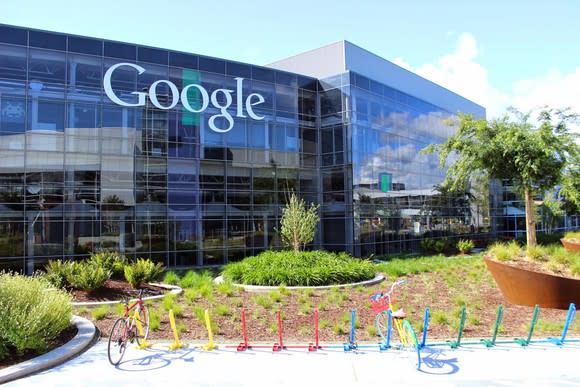Can Alphabet, Inc. Rebound With Its Third-Quarter Report?
Alphabet (NASDAQ: GOOG)(NASDAQ: GOOGL) is set to announced third-quarter 2018 results on Thursday after the market close. With shares down nearly 18% from their all-time high set almost three months ago -- albeit enabled by a rather intense broad-market pullback in that time -- now is the time to consider what the parent company of Google will have to say when its latest release hits the wires.
Let's take a closer look, then, at the moving parts underlying Alphabet's performance and what the market is expecting from the global internet search giant.

IMAGE SOURCE: ALPHABET.
On Alphabet's headline numbers, segment results
Zooming out to Alphabet's headline numbers, note the company doesn't offer specific quarterly revenue or earnings guidance. So, for perspective, consensus estimates predict its quarterly revenue will have increased 22.6% to $34.05 billion, translating to earnings of $10.40 per share.
Zooming in, recall that Alphabet breaks its results down into two primary segments: Google and "Other Bets."
Google, for its part, includes products like Search, Chrome, YouTube, Gmail, Maps, Play, Cloud, and Android, as well as non-advertising businesses like Cloud, Play, Nest, and other hardware. So Google will continue to generate the vast majority of the company's revenue (it climbed more than 25% last quarter to $32.5 billion) and all of its operating income (up 16.9% to nearly $9 billion in Q2).
Digging deeper, expect Google to offer color on advertising sales from both its own properties (up 26% year over year in Q2 to $23.3 billion) and those of network members' sites (up 13% to $4.4 billion).
Google will also elaborate on trends for aggregate paid clicks (up 58% last quarter), and aggregate cost per click (down 22%), with the latter helping to illustrate how much Google is making per ad. A word of caution to that end, however: Aggregate cost per click will almost certainly continue to decline on a year-over-year basis given excellent growth from YouTube, where the ad formats usually reach users earlier in the purchase funnel so monetize at lower rates. Thus, this shouldn't be of great concern to long-term investors as Alphabet realizes the full potential of its video platform.
As for the hardware side, last quarter CFO Ruth Porat warned that sales growth will likely decelerate this quarter (from 36.5% growth in non-ad revenue last quarter) due to regular seasonality as the company prepares to launch new products ahead of the holidays.
Meanwhile, "Other Bets" is comprised primarily of early-stage companies -- think Waymo's self-driving vehicles and Calico's human longevity projects, for example.
On one hand, while many of these businesses are in their pre-revenue phases, some already generate sales; Other Bets revenue jumped nearly 50% year over year last quarter to a modest $145 million, mostly from Fiber high-speed internet and Verily life sciences products.
On the other hand, these Other Bets are still profoundly unprofitable on a consolidated basis, generating operating losses of more than $700 million last quarter alone. Nonetheless, Alphabet is more than happy to continue funding their roads toward commercialization given both their long-term potential and the astounding profitability of Google.
On the latest European Commission antitrust fine
That said, after getting hit with a record $5.07 billion antitrust fine in July over its alleged abuse of the dominant position of Android in Europe, Alphabet promptly absorbed the massive penalty as an operating expense in its stellar second-quarter report three months ago -- and still generated quarterly GAAP net income of nearly $3.2 billion in the process.
But that doesn't mean Alphabet simply brushed the fine under the rug. Last week, it told investors in an official blog post that it has filed a formal appeal of the EC's decision, while at the same time working feverishly on how it can comply with the decision in the meantime.
Perhaps most notable among its latter efforts, Alphabet revealed plans to introduce a new paid licensing structure starting at the end of this month for smartphone and tablet manufacturers who wish to pre-install Google apps on Android devices to be shipped to Europe. The company says the move should both help it appease the EC's concerns of anti-competitive behavior and offset lost revenue it would have otherwise generated through search queries by pre-installing Google Search and Chrome together for free in the region.
Of course, it's likely still too early for Google to have received word from the EC on whether its compliance plans are satisfactory. But investors would do well to pay attention for any updates to that end.
Looking ahead
Finally, I wouldn't expect Alphabet to break its long-standing streak of not offering specific forward guidance. But Porat does usually provide some thoughts on broader business trends and their longer-term direction -- like trends in advertising momentum, operating expenses, or the thought process behind Alphabet's strategic investments in technology and innovation. Here again, while I suspect there will be plenty of compelling evidence to support Alphabet's plans for continued global dominance, you can rest assured we'll be listening closely to what they have to say.
More From The Motley Fool
Suzanne Frey, an executive at Alphabet, is a member of The Motley Fool's board of directors. Steve Symington has no position in any of the stocks mentioned. The Motley Fool owns shares of and recommends Alphabet (A shares) and Alphabet (C shares). The Motley Fool has a disclosure policy.
